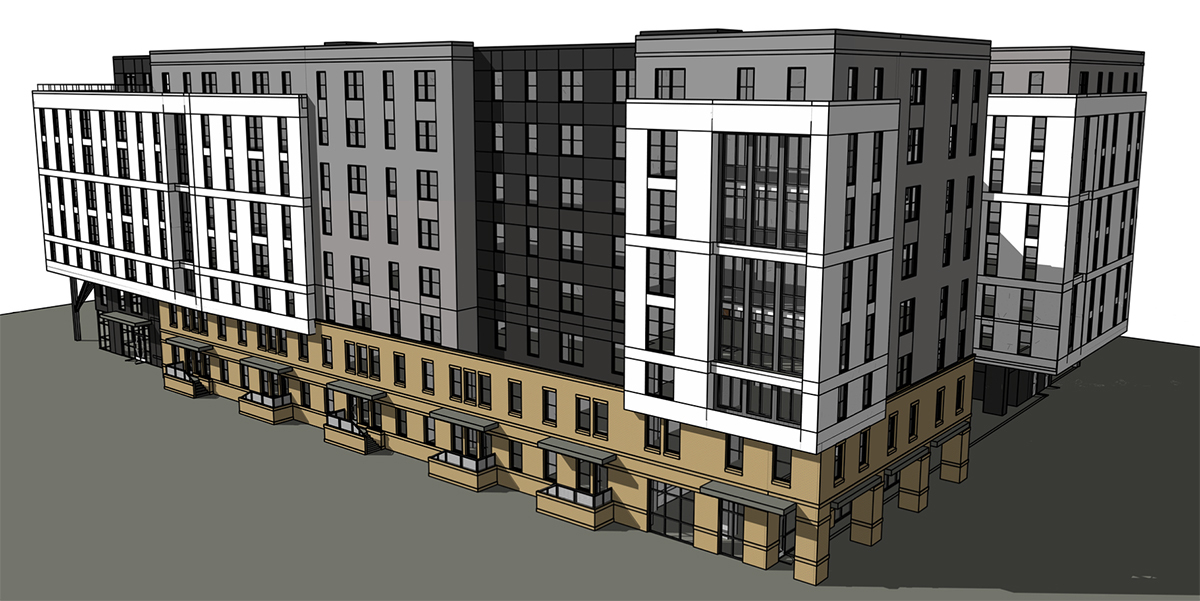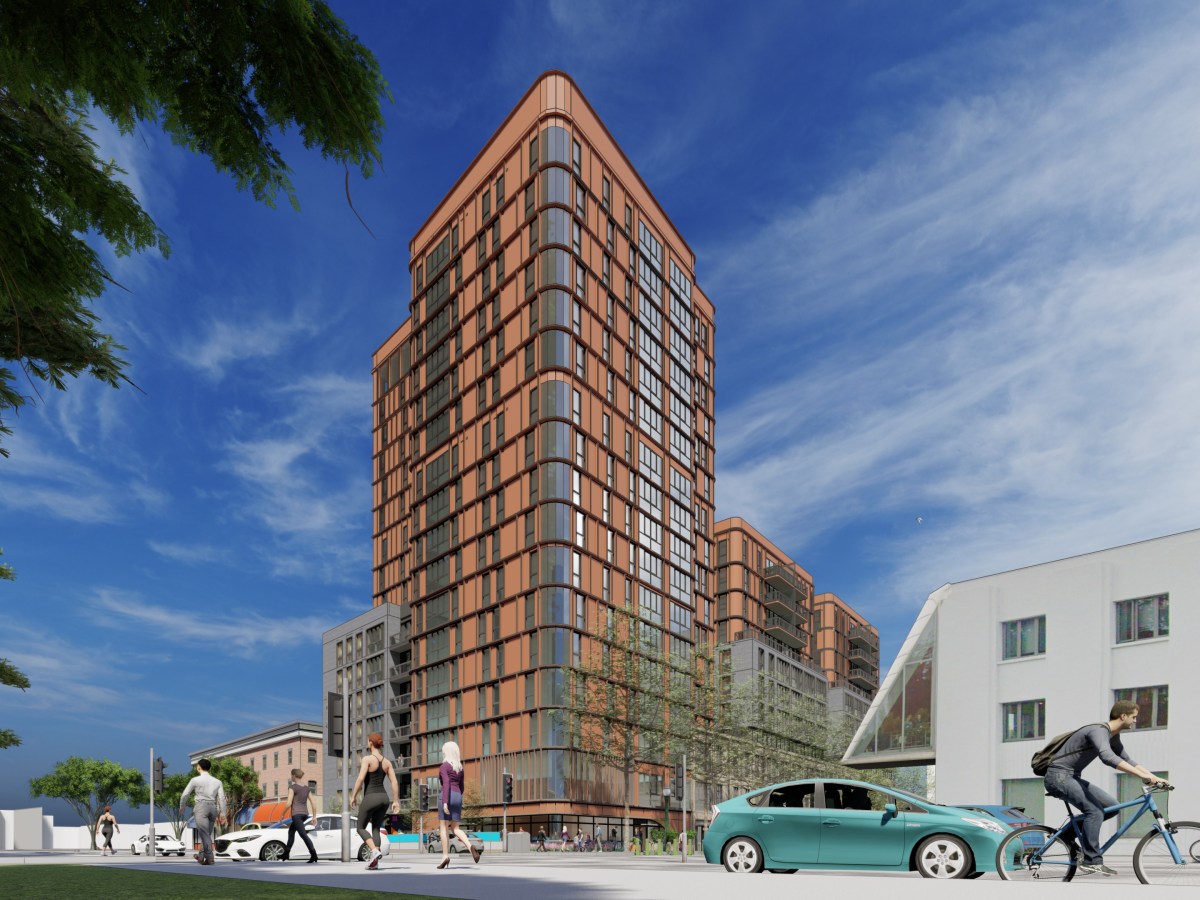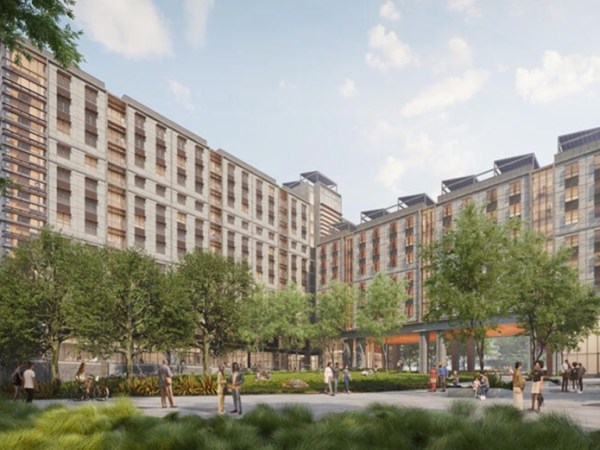
A new company has set its sights on the downtown Berkeley block that was once the center of one of the city’s fiercest development battles.
Chicago-based developer CA Ventures is looking to build an eight-story, 189-unit “off-campus student housing community” at 2065 Kittredge St., according to a preliminary application the firm submitted to the city in July.
That property — better known as 2211 Harold Way, one of its affiliated addresses — was at one point slated to be the site of the 18-story, 302-unit high-rise known as Berkeley Plaza. The $150 million mixed-use proposal was the subject of more than three-dozen city meetings, as well as an unsuccessful court challenge from its opponents, before developer Hill Street Realty unexpectedly scuttled the project in early 2020, saying it had grown too expensive.
Hill Street Realty sold the property to CA Student Living Berkeley LLC in March for $20 million, according to the Bay Area News Group.
CA Ventures’ proposal for the site, which the developer is also calling Berkeley Plaza, would be entirely residential, with a total of 583 bedrooms in units that range from studios to three bedrooms. Eleven of the units would be considered very low income, for renters who make less than half the area median income.
The building would include a 42-space underground parking garage, 114 spaces of bicycle parking, a roof terrace and nearly 10,000 square feet of indoor amenity areas for residents.
The firm’s plans call for demolishing the existing Postal Annex building along Harold Way, between Allston Way and Kittredge Street, leaving intact the portion of the block along Shattuck Avenue, including the historic Shattuck Hotel.
The application, which was first reported by San Francisco Business Times, does not list a cost estimate for the project. CA Ventures did not respond to a request for more information about its plans.
Whether this smaller Berkeley Plaza proposal will encounter the same impassioned opposition Hill Street Realty’s 18-story plan sparked remains to be seen.
To supporters, the previous project — a dense high-rise bringing hundreds of new units to an underused block in the heart of downtown — was precisely the kind of development the Bay Area desperately needed more of amid a worsening housing crisis. But opponents slammed the proposal for its height and lack of affordable units, and said city officials should have exacted a more generous community benefits package from its developer; the project would have contributed $10.5 million to the city’s Housing Trust Fund, among other fees.
The high-rise would have been one of three new 180-foot tall buildings authorized under Berkeley’s 2012 Downtown Plan. To date, only one of those projects, a 16-story hotel at Shattuck and Center, has broken ground. Another, at 2190 Shattuck just across Allston Way from the Berkeley Plaza site, received City Council approval in early 2019.
Another question mark for CA Ventures’ proposal is how it might affect Landmark Shattuck Cinemas, the movie theater that became one of the previous project’s biggest stumbling blocks. The Berkeley City Council’s 2015 approval of the Hill Street Realty proposal required the developer to rebuild the theater, which a representative for the firm said added $15 million to $20 million to the project’s price tag.
CA Ventures submitted its application under the 2019 state housing law SB 330, which streamlines the permitting process and restricts cities’ abilities to block or scale back certain housing projects.
The Department of Planning and Development’s Land Use Division is now reviewing the project, senior planner Sharon Gong said in an email, and it will eventually go before Berkeley’s Zoning Adjustments Board.
One player from the previous Harold Way saga won’t be involved in discussions this time around: Habitot, the children’s museum that long called the Postal Annex building home, moved out of its basement space late last year after closing at the start of the pandemic.
“That small space, with no fresh air and no outdoor space, was really not going to be a sustainable reopening location after the pandemic waned,” Habitot executive director Gina Moreland said.
The museum had been eyeing a move for years, since the previous Berkeley Plaza proposal would have forced it to relocate. Hill Street Realty had agreed to give Habitot $250,000 to help pay for the relocation, but that money never materialized because the project fizzled out.
“The writing has been on the wall for 10 years for us in that building,” Moreland said.
Things have grown more complicated for Habitot since the pandemic took hold, as its plan to move to a new South Berkeley location fell through. For now, Moreland said the museum is holding pop-up events around Berkeley and offering virtual programming, while a fundraising campaign for the relocation — and the search for a new home — continues.
“We are looking for options everywhere,” she said.


